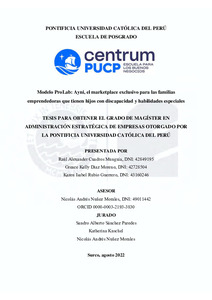| dc.contributor.advisor | Núñez Morales, Nicolás Andrés | |
| dc.contributor.author | Cuadros Munguía, Raúl Alexander | |
| dc.contributor.author | Diaz Moreno, Greace Kelly | |
| dc.contributor.author | Rubio Guerrero, Karen Isabel | |
| dc.date.accessioned | 2022-09-10T15:36:44Z | |
| dc.date.available | 2022-09-10T15:36:44Z | |
| dc.date.created | 2022 | |
| dc.date.issued | 2022-09-10 | |
| dc.identifier.uri | http://hdl.handle.net/20.500.12404/23299 | |
| dc.description.abstract | En el presente documento se identifica un problema social relevante y se propone el
desarrollo de una plataforma que permita conectar a las personas que compran mediante e commerce y estén interesados en apoyar el crecimiento económico de familias que tengan un
integrante con discapacidad y habilidades especiales, generando un modelo de negocio
sostenible al cual denominaremos Ayni, marketplace de carácter inclusivo que permitirá a estas
familias mejorar su calidad de vida a través del incremento de sus ingresos.
La solución fue validada por los clientes potenciales mediante pruebas de usabilidad y
encuestas de aceptación del negocio, obteniendo resultados positivos de las dos hipótesis
planteadas: la primera, el 72% de sellers están dispuestos a vender sus productos a través de
Ayni y la segunda, el 87.6% de los consumidores indicaron que comprarían productos a familias
emprendedoras con algún integrante con discapacidad a través de un marketplace.
Además, se realizaron simulaciones para determinar la efectividad del plan de marketing
diseñado para la adquisición y fidelización de clientes, cuyo resultado obtenido mostró una
rentabilidad de S/ 6.47 por cada sol invertido. Asimismo, se simuló el tiempo promedio de
atención, el cual tuvo una efectividad de 72% para la entrega de productos dentro de un lead time
de 60 horas, mediante lo cual se comprobó la factibilidad del plan de operaciones. Por último, se
validó la viabilidad financiera, dónde se lograron resultados positivos para el negocio: el 73% de
las simulaciones del VAN superan el resultado esperado.
Finalmente, se concluyó que Ayni es un modelo de negocio sostenible y escalable
alineado a la ODS 10, con un índice de relevancia social del 30%, que genera un VAN de
S/ 3’750,246, una TIR modificada de 71% y una inversión de S/ 509,545 con un periodo de
recuperación menor a dos años. | es_ES |
| dc.description.abstract | This document identifies a relevant social problem and proposes the development of a
marketplace that allows connecting people who buy through e-commerce and are interested in
supporting the economic growth of families that have a member with disabilities and special
abilities, generating a sustainable business model which we will call Ayni, an inclusive
marketplace that allows these families to improve their quality of life by increasing their income.
The solution was validated by potential customers through usability tests and business
acceptance surveys, obtaining positive results from the two hypotheses proposed. In the first one,
72% of sellers are willing to sell their products through Ayni, and in the second one, 87.6% of
consumers indicated that they would buy products from entrepreneurial families with disability
members through a marketplace.
In addition to that, simulations were carried out to determine the effectiveness of the
marketing plan for customer acquisition and loyalty. The results obtained show a return of PEN
6.47 for each PEN invested. Likewise, the average lead time was simulated to verify the
feasibility of the operations plan, showing an effectiveness of 72% for the delivery of products
within a proposed lead time of 60 hours. Finally, the financial feasibility was validated, obtaining
positive results for the business plan: 73% of the NPV simulations exceed the expected result.
Finally, it was concluded that Ayni is a sustainable and scalable business model aligned
with SDG #10, with a social relevance index of 30% that generates an NPV of PEN 3’750,246, a
modified IRR of 71%, and an initial investment of PEN 509,545 with a recovery period of less
than 2 years. | es_ES |
| dc.language.iso | spa | es_ES |
| dc.publisher | Pontificia Universidad Católica del Perú | es_ES |
| dc.rights | info:eu-repo/semantics/openAccess | es_ES |
| dc.rights.uri | http://creativecommons.org/licenses/by-nc-nd/2.5/pe/ | * |
| dc.subject | Comercio electrónico--Perú | es_ES |
| dc.subject | Servicios al cliente--Calidad | es_ES |
| dc.subject | Innovaciones tecnológicas | es_ES |
| dc.subject | Sostenibilidad empresarial | es_ES |
| dc.subject | Mercadeo en Internet | es_ES |
| dc.title | Modelo prolab: Ayni, el marketplace exclusivo para las familias emprendedoras que tienen hijos con discapacidad y habilidades especiales | es_ES |
| dc.type | info:eu-repo/semantics/masterThesis | es_ES |
| thesis.degree.name | Maestro en Administración Estratégica de Empresas | es_ES |
| thesis.degree.level | Maestría | es_ES |
| thesis.degree.grantor | Pontificia Universidad Católica del Perú. CENTRUM | es_ES |
| thesis.degree.discipline | Administración Estratégica de Empresas | es_ES |
| renati.advisor.dni | 49011442 | |
| renati.advisor.orcid | https://orcid.org/0000-0003-2193-3830 | es_ES |
| renati.author.dni | 42849195 | |
| renati.author.dni | 42728504 | |
| renati.author.dni | 43160246 | |
| renati.discipline | 413307 | es_ES |
| renati.juror | Sandro Alberto Sanchez Paredes | es_ES |
| renati.juror | Katherina Veronica Maria Kuschel Rietzsch | es_ES |
| renati.juror | Nicolás Andrés Nuñez Morales | es_ES |
| renati.level | https://purl.org/pe-repo/renati/level#maestro | es_ES |
| renati.type | https://purl.org/pe-repo/renati/type#tesis | es_ES |
| dc.publisher.country | PE | es_ES |
| dc.subject.ocde | https://purl.org/pe-repo/ocde/ford#5.02.04 | es_ES |






